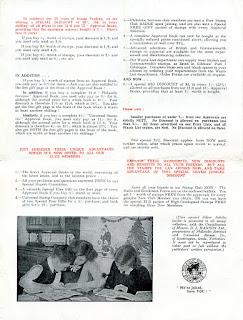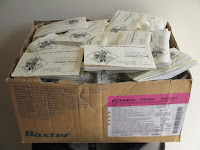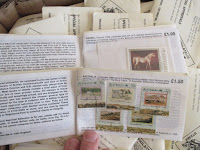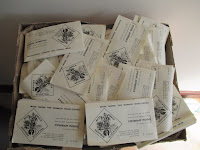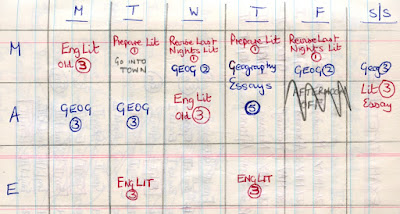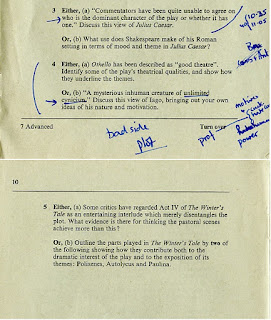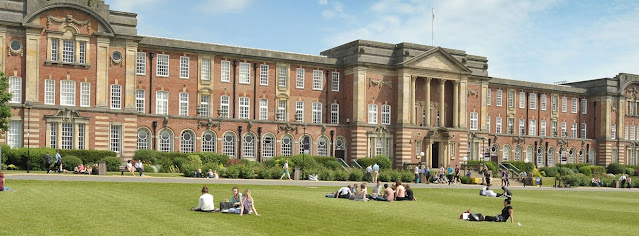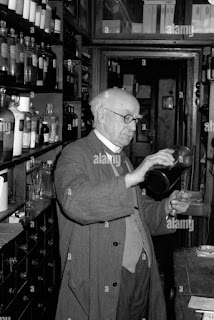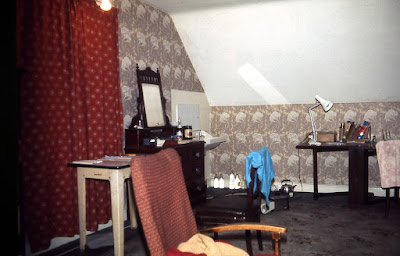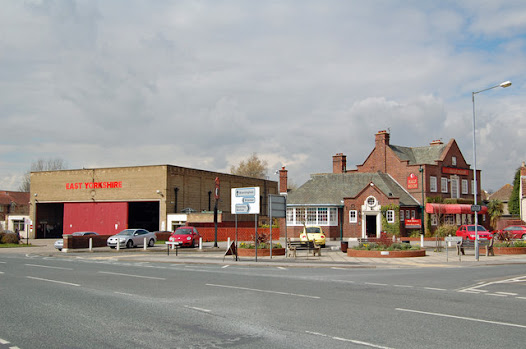From when I was fairly new to Blogging, and often wrote very long posts. Yet it has had over 12,000 views, so I have left it unchanged. The original 70 comments are here, although most commenters (other than Kid - thankyou) seem now to have dropped off Blogger.
The ads were irresistible:
ALL FREE OVER 200 STAMPS PLUS THE FAMOUS PENNY BLACK & CAPE TRIANGULAR FACSIMILES The famous 1840 British “PENNY BLACK” and the 1853 “CAPE TRIANGULAR” facsimiles (originals worth about £45) plus a genuine dealer’s mixture of 200 unsorted stamps (Catalogued over 30/-.), all ABSOLUTELY FREE! Just ask to see our New Approvals. (Please tell your parents.)
This old PENNY RED and approx. 500 stamps for only 1/-. Here’s a super bargain that no collector can afford to miss! Send only 1/- today for this guaranteed and unsorted collection of about 500 stamps, often containing scarce and unusual stamps, plus this Great Britain 1d. Red issued 100 years ago. ... This very valuable offer ... is to introduce our Latest Approval Books. Please tell your parents when sending for Approvals.
This famous BLACK SWAN plus 213 stamps all FREE! The 213 are all DIFFERENT and include 14 Special Stamps (catalogued at over 10/-) such as the 80 year old British ‘Penny Lilac’. Whole collection is catalogued at over 45/-, yet it will be sent FREE to all who ask for our New Approvals. Please tell your Parents.Wow! Two hundred FREE stamps! Five hundred for a shilling! ‘The Children’s Newspaper’, ‘Meccano Magazine’ and most comics were full of such offerings from a massed approval of stamp dealers – heaps of stamps free, or for just a few pence, if only you would ask to see their Approvals. The most prolific pedlars were the Bridgnorth Stamp Company and - undoubtedly the best because it was just along the road from where I lived - Dennis Hanson’s Philatelic Services of Eastrington. Some of his promotions took the form of a super stamp quiz.
The quiz is from 1963 but for anyone who fancies submitting a late entry (at the time of writing I believed the business still existed) I’ve added my answer attempts below at the end. I suggest you increase the value of the 3d. stamp to take account of inflation (second class should do it), and oh yes, don’t forget to tell your parents.
Dennis Hanson started buying bulk stamps while still at school in Scarborough in 1935, sorting them into small packets, and selling them to his school friends and also through his father’s general store. He moved to Eastrington two years later and over the years has traded under a variety of names including Philatelic Services, D. J. Hanson, The Stamp Club and The Universal Stamp Company. He was still in business seventy-five years later although he has never gone online. Over this time, dozens of Eastrington ladies have found agreeable employment fixing stamps into Approvals booklets and posting them out to customers.
 |
| Dennis Hanson and his staff in 1993 (from Howdenshire History) |
As one of those customers it’s not easy to explain the appeal of stamp collecting to the screen-fixated youngsters of today, yet it used to be among the most popular childhood hobbies for both girls and boys. You could spend hours in exaltation, sorting through piles of stamps, carefully separating them from their envelope corners in a bowl of water, and drying them out between sheets of blotting paper.
The attraction was of course in the sheer beauty of the stamps, their vivid colours and stunning art work, and the way they captured the imagination by association with the history and geography of the world - conflict in Europe, communist revolution, African exploration, colonial independence. Looking again at my old stamp album (having just retrieved it from the loft where it was in a brown paper parcel wrapped up long ago by my dad). I’m amazed to see how much time I must have spent drawing little maps and transcribing information about different countries.
 |
| Stamps from Aden, where my aunt and uncle lived for a time, overflowed their page very quickly |
A wodge of approval booklet pages from which the stamps have been removed show that I didn’t resist. I spent a small fortune – around 60 empty pages with a total value approaching £5 (which would have a purchasing power of around £100 today, and more than double that in terms of earnings): “Very scarce set of 6 mint & used Albania 1917 Koritza Eagles 2/-”, “Complete fine-used set of 2 Hungary 1952 Railway Day (catalogued 1/6d.) 9d.”, “Handsome set of 6 mint Paraguay 1958 President Stroessner 1/6”. And then a page in red ink:
Superb stamps given Free. They are not for sale they are FREE . . . Set of 3 unused Herm Island 1954 Triangular Sea-Birds, local stamps with a face value of 1/2d., from part of the United Kingdom. Now obsolete and scarce. . . . YES, ABSOLUTELY FREE OF CHARGE. If you purchase 5/- worth or more from this Approval Book you may take this page right out of the book and keep it. These grand stamps will add lots of value and interest to your collection! It’s our way of showing our appreciation of your valued patronage.
As with most people, my interest waned as I grew older, although losing myself in my album now, in reverie, I could easily imagine taking it up once more, becoming expert in a specific area, something unfashionable and politically incorrect, perhaps stamps of the British Empire, assimilating all the lessons from history they bring with them.
What began to turn me off was in fact the antics of the very same Dennis Hanson who so altruistically cultivated my interest in the hobby in the first place. His bulk packets of unsorted stamps contained far too many cheap and flimsy ones from far eastern countries, and a disproportionately high number portraying the grim bespectacled face of King Baudouin of Belgium who looked like the dad of one of my friends.
Even more unforgivable were the Approvals that weren’t really proper stamps at all. The Herm Island stamps mentioned above were one example, used only for a private postal service from Herm to the nearest official post office on Guernsey, and obviously printed as a commodity to sell to tourists. But it was the stamps of South Molucca that really annoyed me.
“These Stamps will never be catalogued” it said on the front of one booklet. On another “Stamps of the South Moluccas Republic and the Forgotten War. ... although not listed by Gibbons, they are undoubtedly of philatelic interest.” And although they may have looked magnificent with their colourful images of the mammals, birds, fish, butterflies and plants of a small group of Indonesian islands, the republic never gained independence. Some stamps were issued by a would-be government in exile in the Netherlands, and others were produced without authorisation by a German stamp dealer. None were ever postally used and no reputable dealer should ever have touched them. Four pages crammed-full of bogus Republik Maluku Selatan stamps in my album show I was well and truly taken in.
POSTSCRIPT - No reply at all. Not even a facsimile.
SECOND POSTSCRIPT
In early August 2015 I received the following email:
My name is Charlotte Hanson I was googling my Grandad Dennis Hanson and came across your recent post. My Grandad sadly passed away on 29/07/2015. I know he would have loved to have read your post and give you a personal response to your quiz questions if it wasn't for his ill health this year. It makes us proud to find so much information about him on the Internet so thank you.
I replied to say how sorry I was to hear of her grandad's death, and thanked her for not jumping on my rather irreverent post. Dennis Hanson made a go of doing his own thing – an example for us all I think. A notice appeared in the Yorkshire Post and other regional newspapers, and an obituary on the East Yorkshire Local and Family History blog.
Other Hanson items (right click and open in new tab for full size):
In the original comments was a discussion of a box of around 200 unused approvals booklets sold on ebay in August 2017 for £227. Here are the images associated with the listing (right click to enlarge):









